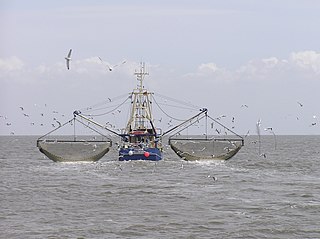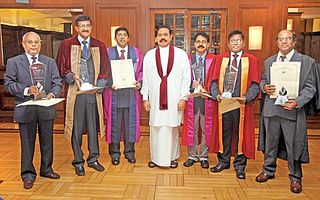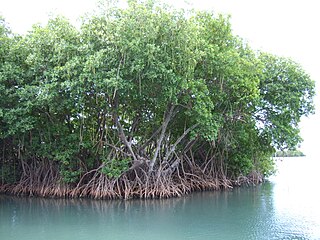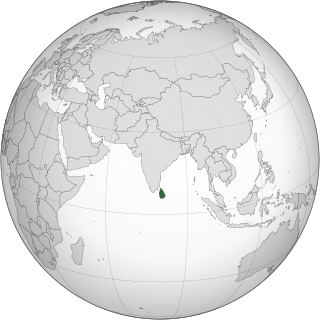Related Research Articles

Aquaculture, also known as aquafarming, is the controlled cultivation ("farming") of aquatic organisms such as fish, crustaceans, mollusks, algae and other organisms of value such as aquatic plants. Aquaculture involves cultivating freshwater, brackish water and saltwater populations under controlled or semi-natural conditions, and can be contrasted with commercial fishing, which is the harvesting of wild fish. Aquaculture is also a practice used for restoring and rehabilitating marine and freshwater ecosystems. Mariculture, commonly known as marine farming, is aquaculture in seawater habitats and lagoons, as opposed to freshwater aquaculture. Pisciculture is a type of aquaculture that consists of fish farming to obtain fish products as food.

A wetland is a distinct ecosystem that is flooded or saturated by water, either permanently for years or decades or seasonally for a shorter periods. Flooding results in oxygen-free anoxic processes prevailing, especially in the soils. The primary factor that distinguishes wetlands from terrestrial land forms or water bodies is the characteristic vegetation of aquatic plants, adapted to the unique anoxic hydric soils. Wetlands are considered among the most biologically diverse of all ecosystems, serving as home to a wide range of plant and animal species. Methods for assessing wetland functions, wetland ecological health, and general wetland condition have been developed for many regions of the world. These methods have contributed to wetland conservation partly by raising public awareness of the functions some wetlands provide. Constructed wetlands are designed and built to treat municipal and industrial wastewater as well as to divert stormwater runoff. Constructed wetlands may also play a role in water-sensitive urban design.

Fishery can mean either the enterprise of raising or harvesting fish and other aquatic life or, more commonly, the site where such enterprise takes place. Commercial fisheries include wild fisheries and fish farms, both in freshwater waterbodies and the oceans. About 500 million people worldwide are economically dependent on fisheries. 171 million tonnes of fish were produced in 2016, but overfishing is an increasing problem, causing declines in some populations.

The sambar is a large deer native to the Indian subcontinent, South China and Southeast Asia that is listed as a vulnerable species on the IUCN Red List since 2008. Populations have declined substantially due to severe hunting, local insurgency, and industrial exploitation of habitat.

Wayamba University of Sri Lanka is the thirteenth national university in Sri Lanka. It was established as the Affiliated University College of North Western Province in 1991 and after it was become the Rajarata University of Sri Lanka "Wayamba mandapa" in 1996.It was a full flagged university naming as Wayamba University of Sri Lanka in 1999. The main purpose of the university is offering English-medium degree, diploma and certificate courses in areas such as Agriculture, Applied Science, Management and Technology for students and working professionals. The courses are highly up-to-date and job-oriented.

Vidya Jyothi Sarath Wimalabandara Kotagama is a Sri Lankan ornithologist and environmentalist. He is a Professor Emeritus and former head of the Department of Zoology, University of Colombo.

A wild fishery is a natural body of water with a sizeable free-ranging fish or other aquatic animal population that can be harvested for its commercial value. Wild fisheries can be marine (saltwater) or lacustrine/riverine (freshwater), and rely heavily on the carrying capacity of the local aquatic ecosystem.

Human–wildlife conflict (HWC) refers to the negative interactions between humans and wild animals, with undesirable consequences both for people and their resources on the one hand, and wildlife and their habitats on the other. HWC, caused by competition for natural resources between human and wildlife, influences human food security and the well-being of both humans and other animals. In many regions, the number of these conflicts has increased in recent decades as a result of human population growth and the transformation of land use.
The wildlife of Sri Lanka includes its flora and fauna and their natural habitats. Sri Lanka has one of the highest rates of biological endemism.

The wildlife of Pakistan comprises a diverse flora and fauna in a wide range of habitats from sea level to high elevation areas in the mountains, including 195 mammal, 668 bird species and more than 5000 species of Invertebrates. This diverse composition of the country's fauna is associated with its location in the transitional zone between two major zoogeographical regions, the Palearctic, and the Oriental. The northern regions of Pakistan, which include Khyber Pakhtunkhwa and Gilgit Baltistan include portions of two biodiversity hotspot, Mountains of Central Asia and Himalayas.

Rajarata University of Sri Lanka is a public university located in the historic city of Mihintale, near Anuradhapura, Sri Lanka. The Rajarata University of Sri Lanka was established as the eleventh University in Sri Lanka and was opened on 31 January 1996 by President Chandrika Kumaratunga.

M. J. S. Wijeyaratne is a Sri Lankan academic. He was the Vice-Chancellor of University of Kelaniya and Professor of Zoology.

Peam Krasop Wildlife Sanctuary is a protected area located in southwestern Cambodia, covering 245.91 km2 (94.95 sq mi). It was established in 1993.

Fisheries are affected by climate change in many ways: marine aquatic ecosystems are being affected by rising ocean temperatures, ocean acidification and ocean deoxygenation, while freshwater ecosystems are being impacted by changes in water temperature, water flow, and fish habitat loss. These effects vary in the context of each fishery. Climate change is modifying fish distributions and the productivity of marine and freshwater species. Climate change is expected to lead to significant changes in the availability and trade of fish products. The geopolitical and economic consequences will be significant, especially for the countries most dependent on the sector. The biggest decreases in maximum catch potential can be expected in the tropics, mostly in the South Pacific regions.

Mangrove ecosystems represent natural capital capable of producing a wide range of goods and services for coastal environments and communities and society as a whole. Some of these outputs, such as timber, are freely exchanged in formal markets. Value is determined in these markets through exchange and quantified in terms of price. Mangroves are important for aquatic life and home for many species of fish.
Lindsay Margaret Laird was a British biologist who was influential in the development of the aquaculture of salmon and other fishes through her research, teaching and the books that she produced. She defined the standards for Organic Farmed Salmon, and introduced quality assurance labelling for farmed salmon.

Environmental issues in Sri Lanka include large-scale logging of forests and degradation of mangroves, coral reefs and soil. Air pollution and water pollution are challenges for Sri Lanka since both cause negative health impacts. Overfishing and insufficient waste management, especially in rural areas, leads to environmental pollution. Sri Lanka is also vulnerable to climate change impacts such as extreme weather events and sea level rise.

Rekawa Lagoon is a coastal waterbody located in Hambantota Districtt in the Southern Province, Sri Lanka and it is located 200 km (120 mi) south of Colombo. The lagoon possesses a rich biodiversity with a variety of flora and fauna.

Jagath Gunawardana is a lawyer, environmentalist and educator based in Sri Lanka. Gunawardana is known for his advocacy in wildlife conservation and environmental protection.
References
- 1 2 3 "Action to protect wetlands". Sunday Observer. 2022-02-11. Retrieved 2022-02-21.
- 1 2 3 "Dr. (Mrs) S. Jayakody | Faculty of Livestock Fisheries and Nutrition - WUSL" . Retrieved 2022-02-21.
- ↑ "Highlights and images of main proceedings for 5 October 2018". IISD Earth Negotiations Bulletin. Retrieved 2022-02-21.
- ↑ "Sri Lanka mulls declaration of Sensitive Marine Protection Zone". Sri Lanka News - Newsfirst. 2021-10-18. Retrieved 2022-02-21.
- ↑ "Mangrove Blue Carbon for Climate Change Mitigation – Commonwealth Bluecharter". bluecharter.thecommonwealth.org. Retrieved 2022-02-21.
- ↑ Nadeera, Dilshan. "Revive mangroves degraded by shrimp farms" . Retrieved 2022-02-21.
- ↑ "Dr. Sevvandi Jayakody". Environment Foundation (Guarantee) Limited. Retrieved 2022-02-21.